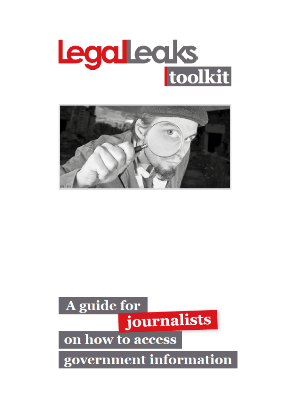Helping journalists get access to information
Journalists play a central role in initiating and stimulating public debates, but face constant challenges in accessing information from public bodies, particularly when that information relates to sensitive issues such as corruption, organised crime, environmental contamination, or relationships with business and lobby groups.
The right of access to information and access to information laws have become a crucial tool in this context. They guarantee journalists access to information held by public bodies for their stories and investigations, enabling them to exercise their role as public watchdogs in our democracies.
The Legal Leaks Toolkit, developed by Access Info Europe and n-ost, helps journalists obtain information using access to information laws.
The Legal Leaks Toolkit
This toolkit is designed for journalists working in any media – newspapers, radio, and television – as well as bloggers and other information professionals who need to get access to information held by public bodies for their stories.
The toolkit is for journalists making requests in their own country or considering filing a request in another country. It is based on a comparative analysis of the access to information of the 42 countries of the Council of Europe region which have such laws. In many places in the text we have put references where national law or practice deviates from the normal access to information standards.
Download here the international version of the Legal Leaks Toolkit (in English) which can be adapted to the legal framework of any country. The existing national versions, translated into local languages, are available below.
Download the Toolkits!
Plan ahead to save time
Think about submitting a formal access request whenever you set out to look for information. It’s better not to wait until you have exhausted all other possibilities. You will save time by submitting a request at the beginning of your research and carrying out other investigations in parallel.
Start out simple
In all countries, it is better to start with a simple request for information and then to add more questions once you get the initial information. That way you don’t run the risk of the public institution applying an extension because it is a “complex request”.
Submit multiple requests
If you are unsure where to submit your request, there is nothing to stop you submitting the request with two, three or more bodies at the same time. In some cases, the various bodies will give you different answers, but this can actually be helpful in giving you a fuller picture of the information available on the subject you are investigating.
Mention your right to information
Usually the law does not require that you mention the access to information law or freedom of information act, but this is recommended because it shows you know your legal rights and is likely to encourage correct processing of the requests according to the law. We note that for requests to the EU it’s important to mention that it’s an access to documents request and it’s best to make a specific mention of Regulation 1049/2001. It is also recommended that you use language and etiquette appropriate to any other professional communication in your country. Remember: There is also no need to say why you want the information, nor to answer questions about the reason for asking or what you will do with the information.
Tell them you are a journalist
If the law says only individuals can request information but you want to let the public institution know that you are a journalist working for a media outlet, you could always write your request on your organisation’s letterhead. BUT before you do this you should be sure that this is acceptable with the organisation. Another option is to mention in the letter or e-mail that you are a journalist and/or who you work for.
… or don’t tell them you are a journalist!
If you send an e-mail from your work address, it will often be obvious that you are a journalist, e.g.: jsmith@dailytimes.com. If you don’t want to give the game away, it might be worth using a different address, such as a gmail/hotmail/yahoo account.
Hide your request in a more general one
If you decide to hide your real request in a more general one, then you should make your request broad enough so that it captures the information you want but not so broad as to be unclear or discourage a response. Specific and clear requests tend to get faster and better answers.
Anticipate the exceptions
If you think that exceptions might be applied to your request, then, when preparing your questions, separate the question about the potentially sensitive information from the other information that common sense would say should not fall under an exception. Then split your question in two and submit the two requests separately.
Check the rules about fees
Before you start submitting a request, check the rules about fees for either submitting requests or receiving information. That way, if a public official suddenly asks you for money, you will know what your rights are.
Ask for electronic copies to avoid copying costs
To avoid costs for copying and posting information, mention in your request that you would prefer the information in electronic format. That way you will avoid paying a fee, unless of course the information is not available electronically, although these days it’s usually possible to scan documents which are not already digitalised and then to send them as an attachment by e-mail.
Ask for access to the files
If you live near where the information is held (for example you live in the capital where the documents are kept), you can also ask to inspect original documents. This can be helpful when researching information that might be held in a large number of documents that you’d like to have a look through. Such inspection should be free of charge and should be arranged at a time that is reasonable and convenient for you.
Keep a record!
We advise you to make your request in writing and to save a copy or a record of it so that in the future you are able to demonstrate that your request was sent, in case you need to make an appeal against failure to answer, for example. This also gives you some evidence of submitting the request if you are planning to do a story on it.
Speed up answers by making it public you submitted a request
If you write or broadcast a story that the request has been submitted, it can put pressure on the public institution to process and respond to the request. You can update the information as and when you get a response to the request – or if the deadline passes and there is no response you can make this into a news story as well. Doing this has the additional benefit of educating members of the public about the right of access to information and how it works in practice.
Prepare to appeal against refusals and silence
Find out about appeals in advance, including the time-frame for presenting an appeal. If you are not sure what to do for the first stage of appeal, contact the office of your Information Commission/Commissioner or Ombudsman and they will be able to help you. If you don’t have such a body, try phoning the institution which issued the refusal and asking them. If you still are having problems, then contact the Legal Leaks Help Desk about it and we will try to help you, for example, by giving you the contact of an NGO or lawyer in the country.
Make a story our of refusals
The refusal to release information following a request is often a story in itself. Be creative and constructive with the fact that the information was refused, get examples from other countries, ask experts what they already know, discuss the public interest in the information and try to use the story to press for greater transparency.
Appeal based on the public interest
If you have been refused information that you wanted for a story you are working on, it might help to state in your internal administrative appeal that the information is needed for a media story and to state that there is a public interest in knowing that information. It’s also important at this point to refer to your rights under the access to information law and/or constitution. (Of course, if you don’t want the public authority to know you are working on a story, then don’t mention it).
Make a standard template for appeals
Once you have drafted the first internal administrative appeal with references to the law and your rights, just keep the letter in your computer and you’ll find that you have a template for future appeals. That will save you time as it should only need a little bit of changing depending on the content of the other requests.
Get help to address problems with spokespersons
If you are finding that official spokespersons are angry at you for using the access to information law, then talk to the Legal Leaks team and/or your local access to information organisation or journalists’ association. These NGOs might be able to raise your concerns and perhaps organise a training session for spokespersons to explain journalist’s rights under the law. They should also be able to support you in your discussions with government about giving proper treatment to formal access to information requests submitted by journalists.
Involve your colleagues in using access to information
If your colleagues are sceptical about the value of access to information requests, one of the best ways to convince them is to write a story based on information you obtained using an access to information law. Mentioning in the final article or broadcast piece that you used the law is also recommended as a way of enforcing its value and raising public awareness of the right.
Submit international requests
Increasingly requests can be submitted electronically, so it doesn’t matter where you live. Alternatively, if you do not live in the country where you want to submit the request, you can sometimes send the request to the embassy and they should transfer it to the competent public body. You will need to check with the relevant embassy first if they are ready to do this – sometimes the embassy staff will not have been trained in the right to information and if this seems to be the case, it’s safer to submit the request directly to the relevant public body.

Access Info Europe is an international human rights organisation, based in Madrid, which works to promote a strong and functioning right of access to information in Europe and globally.
Access Info’s goal is for the right of access to information to serve as a tool for defending civil liberties and human rights, for facilitating public participation in decision-making, and for holding governments accountable.
For more information visit www.access-info.org

The Network for Reporting on Eastern Europe n-ost links journalists and media initiatives from about twenty European countries. They all share a European vision that encompasses both the east and the west of Europe. The focus of n-ost is on detailed reports from and about Eastern Europe.
Members of n-ost are against restrictions that limit journalistic endeavour. The network organizes training programmes for journalists, conferences, research journeys and international media projects.
For more information visit www.n-ost.de













